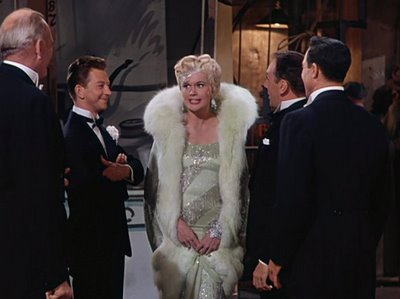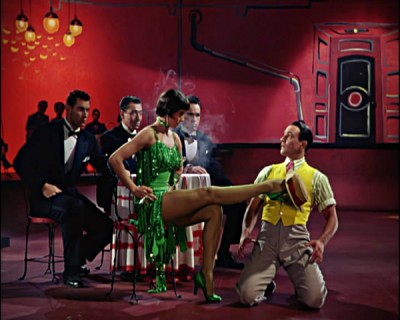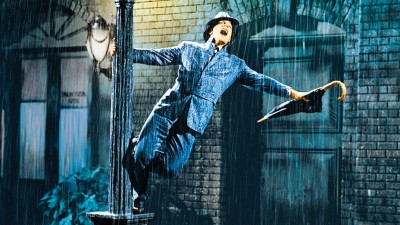
I am about to commit movie heresy, so rather than put it off I’m just going to go ahead and do it — I don’t care for Singin’ in the Rain (1952). I do not think it’s the greatest musical ever made — far, far from it — and I know it’s not much of a Hollywood satire. Yes, the title number is pretty irresistible, but otherwise I just don’t think it’s the great movie it’s cracked up to be. Now, when I was a kid, I liked it OK. And when I was 19, I saw it on the big screen and found the experience pleasant enough — apart from the “Broadway Rhythm Ballet,” which stops the film dead in its tracks for no good reason. But as the years have passed, I find it more and more a chore to sit through — though I freely confess to laughing at Donald O’Connor’s suggestion that a movie be called The Dueling Mammy and that Jean Hagen’s line, “Then all our hard work ain’t been in vain for nothing,” has found its way into my personal lexicon.

My biggest problem with Singin’ in the Rain probably stems from the fact that I just don’t care for the MGM approach to the musical. While I have scads of musical films on my shelves, only three of them are from MGM — Cabin in the Sky (1942), High Society (1956), and Silk Stockings (1957). (And, yes, I know that High Society isn’t much of a movie, but I fell in love with the Cole Porter songs from my parents’ soundtrack album when I was 3 years old and it stuck.) I have tried, tried and tried to like their movies, but it just doesn’t happen. The fault probably lies with me. That said, there are specific aspects of Singin’ in the Rain that I have issues with. First of all, it has a bad case of the “quaints.” The “quaints” is a tendency found in a lot of period pieces — particularly prevalent in the 1950s — where too much of the humor is grounded in the idea that folks and things from an earlier time are just a hoot because they’re so backwards. It is this aspect of the movie that causes its supposed depiction of the dawn of sound to fall flat — for me. If you actually know that era, this is all shallow, simplistic and just plain wrong. It presents the filmmakers of that time as clueless boobs, and while that may not be entirely wrong, the approach is too broad and too false to qualify as the satire it thinks it is. If you want a real satire on the era, seek out the 1932 film of the Moss Hart-George S. Kaufman play Once in a Lifetime — now that is an on-target satire of Hollywood at the dawn of the talkies. This … this can’t even get the orchestrations of its songs right.

I have no illusions that my personal issues with Singin’ in the Rain are going to make a dent in its popularity. It’s too firmly entrenched — and I really don’t mind that in itself, but I can’t bring myself to buy into it. But by all means, see it. Everyone should. Enjoy it if it appeals to you — and it probably will unless you just don’t like musicals — but don’t take it as accurate, and don’t just blindly accept that it’s the end-all-be-all of the musical film. Check out Stanley Donen’s later Funny Face (1957) — a much more accurate barometer of what the director could do than this is.
The Hendersonville Film Society will show Singin’ in the Rain Sunday, July 14, at 2 p.m. in the Smoky Mountain Theater at Lake Pointe Landing Retirement Community (behind Epic Cinemas), 333 Thompson St., Hendersonville.




apart from the “Broadway Rhythm Ballet,” which stops the film dead in its tracks for no good reason.
Yes! So much so that it removes “Masterpiece” from the table– and probably ought to have more people stingy with “Great”.
Still, I’ve always enjoyed it a good deal. Even if the “Good Morning” number went from pleasant and catchy to downright obnoxious and stick in my head somebody please shoot me intrusive a long time ago.
Oh and interesting read about how the film fails in the elements of satire that it’s usually credited for.
Any truth to the claim that Jean Hagen had all kinds of trouble finding work after her role here due to the fact that studio heads assumed that Lena’s voice was in fact her real voice?
Even if the “Good Morning” number went from pleasant and catchy to downright obnoxious and stick in my head somebody please shoot me intrusive a long time ago.
Understandable, but…what about “Moses?”
Any truth to the claim that Jean Hagen had all kinds of trouble finding work after her role here due to the fact that studio heads assumed that Lena’s voice was in fact her real voice?
Considering she spent the next three years playing Danny Thomas’ wife on the popular Make Room for Daddy TV series, I’d say no.